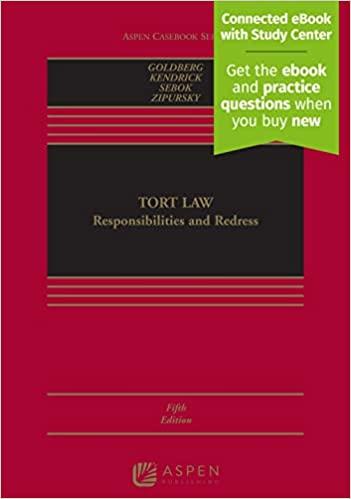Question
1.A court decision upon which courts later rely in similar cases is known as a(n) ______. injunction precedent arbitration statutory review 2.The supremacy clause is
1.A court decision upon which courts later rely in similar cases is known as a(n) ______.
injunction
precedent
arbitration
statutory review
2.The supremacy clause is a provision of the United States Constitution that _____.
grants Congress the power to regulate trade with foreign nations, and among the several states, and with the Indian tribes.
mandates that each state respect and enforce both the judgments awarded by courts in other states, and the statutes and case law of other states.
prohibits the states from discriminating on the basis of race or national origin.
requires judges to follow federal law in the event of a conflict with state law.
3.Administrative agencies:
exist only at the federal level of government.
exist at all levels of government: federal, state and local levels.
exist only at the city/municipality level of government.
exist only at the state level of government.
4.The legal document formally creating an agency is called a(n):
power of attorney.
unilateral contract.
deed.
guaranty.
5.The standards and principles that govern an individual within society is called:
ethics.
religion.
values.
morals.
6.Crimes are classified into three groups according to the seriousness of the offense. They are ______.
treason, felony and misdemeanor
bilateral, unilateral and personal
offer, acceptance and consideration
formal, informal and hybrid
7.Examples of misdemeanors include all of the following except ______.
murder
thefts of small amounts of money
traffic offenses
use of illegal measuring devices
8.If the person accused of __________ had a special privilege, such as an attorney in a court proceeding who accuses a witness of lying, then the complainant cannot recover damages.
larceny
false imprisonment
defamation
negligence
9.The interference of the public's enjoyment of life or property is called a(n) __________.
public nuisance
corporate nuisance
international nuisance
private nuisance
10.To be legally enforceable, a contract must contain the six elements. If one of these elements is missing, the court will usually:
enforce the contract.
refer the matter to the superior courts.
refuse to enforce the contract.
validate the contract.
Step by Step Solution
There are 3 Steps involved in it
Step: 1

Get Instant Access to Expert-Tailored Solutions
See step-by-step solutions with expert insights and AI powered tools for academic success
Step: 2

Step: 3

Ace Your Homework with AI
Get the answers you need in no time with our AI-driven, step-by-step assistance
Get Started


